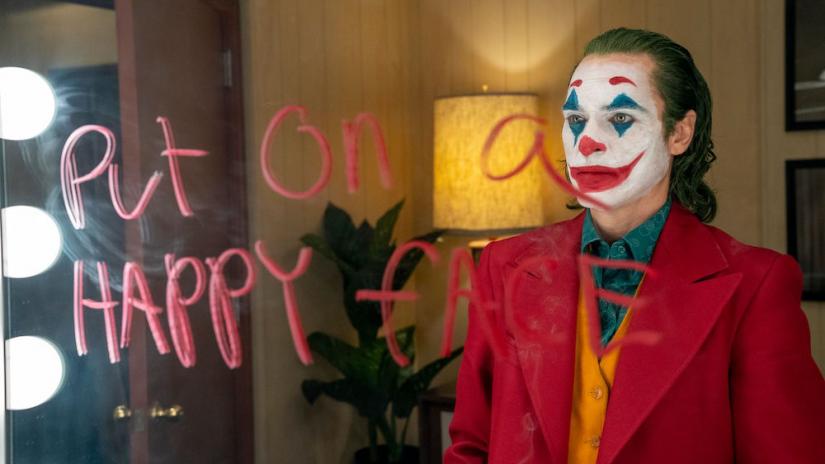Review: “Joker”
Several Actors Have Taken on the “Clown Prince of Crime.” Now it’s Joaquin Phoenix’s Turn.
PHOTO BY ANDIFLAMEBOY12 VIA FLICKR
Joaquin Phoenix stars as the “clown prince of crime” in the film that has been generating both critical acclaim and sociopolitical controversy.
October 16, 2019
Todd Phillips’ “Joker” isn’t so much a “comic book film” as it is an experiment within the same subgenre, one that’s geared more towards an adult audience reminiscing about the days when the industry gave them something more: a time where studio-driven projects looked to take risks as opposed to always playing the norm. With “Joker,” Phillips aims to accomplish “what Marvel can’t do,” by directing and co-writing (with “The Fighter” scribe Scott Silver) an intensely up-close character study whose purpose is to not tie in with a cinematic universe, but to take a character that’s as renowned and iconic as “the clown prince of crime” and say, “Let’s see how the setting and society that surround this man ultimately allowed this guy to become an inhuman monster.”
The setting in question is the crime-ridden and poverty-stricken Gotham City of 1981. Arthur Fleck (Joaquin Phoenix), our supposed “protagonist,” is what happens when you combine Rupert Pupkin and Travis Bickle from both Martin Scorsese’s “The King of Comedy” (1982) and “Taxi Driver” (1976). He seems well-intentioned, but in reality, he’s a former mental patient with an unusual condition that many pedestrians around him believe is an immature joke: unexpected and uncontrollable laughter. Working as a clown-for-hire by day and a wannabe stand-up comedian by night, Fleck is constantly struggling to lift the weight of his unfortunate life off his head.
As he lives with his mother (Frances Conroy) in a worn-down apartment complex, his only feelings of salvation come from imagining himself as a welcomed guest on talk-show host Murray Franklin’s (Robert De Niro) late-night programming, and a friendship with a local single mother (Zazie Beetz) that he seems to interpret as something more. Eventually, however, it all violently becomes clear to Fleck as he realizes that, in order to finally get the attention he so desperately desires, all he has to do is take control of his identity. He has to harness his “negative thoughts” into something greater. And then maybe, just maybe, he’ll finally be able to “put on a happy face” once and for all.
From the opening shot to the final few minutes, this is 100% Phoenix’s film, and he owns every single scene he’s in. Displaying a sense of unhinged vulnerability and ultimately portraying himself as an “innocent, yet ticking time-bomb,” Phoenix brings something new to this character that the likes of Nicholson, Hamill, Romaro, Leto, and yes, even Ledger have never brought before. Does that necessarily mean his performance as the titular anarchist will make him “the next great Joker?” Personally, that’s debatable. But what isn’t is that Phoenix, as always, beautifully captures his character’s essence in ways that would almost intimidate other method actors of the same caliber.
Both Lawrence Sher’s immaculate cinematography and “Chernobyl” composer Hildur Guðnadóttir’s haunting and almost depressing original score help to dramatically amplify the tone that Phillips is going for. They both contribute to the “Scorsese-esque” environment he wanted to recreate on screen, one that particularly isn’t looking to hold back. It’s an environment that immediately throws the viewer into a state of psychological and repressive turmoil, with a main character that is slowly getting pushed to his absolute breaking point through the “incidents” he sometimes brings upon himself.
At the same time, his crimes are what disproves the audience currently believing that this film will “inspire future Jokers,” in that Fleck’s motivation, while arguably understandable given his background, is executed in a way that eventually demoralizes his personality. In other words, sympathy for Fleck is apparent — to a point, when one realizes that he is the Joker after all.
There are some moments, however, that seem like self-aware “nudges” at knowledgeable viewers regarding the role of Thomas Wayne (Brent Cullen) in the narrative. During the film’s tension-escalating climax, the rest of the DC Universe sometimes seems like it’s trying to find its way into an otherwise grounded environment, when in reality, it never really needed to. And when considering the fact that Phillips always intended the film to be separate from other DC films, it’s almost confusing as to why he included that particular connection.
But most of all, I’m incredibly happy that a mainstream film such as this exists. I’m happy because Phillips reportedly tried to convince Warner Bros. to properly greenlight this project for more than a year. I’m happy that in a subgenre that has become crowded with copycat ideas and franchise potential, this film decides to forgo any presumed identities by establishing its own presence, even if it’s directly inspired by other stories that have (admittedly) done it better. Even with the apparent “controversy” that’s currently sweeping the internet, and the “like-to-dislike” ratio aside, this is a cautionary tale in the best way possible. Not bad for a director whose most well-written characters include Frank the Tank and The Wolfpack.












